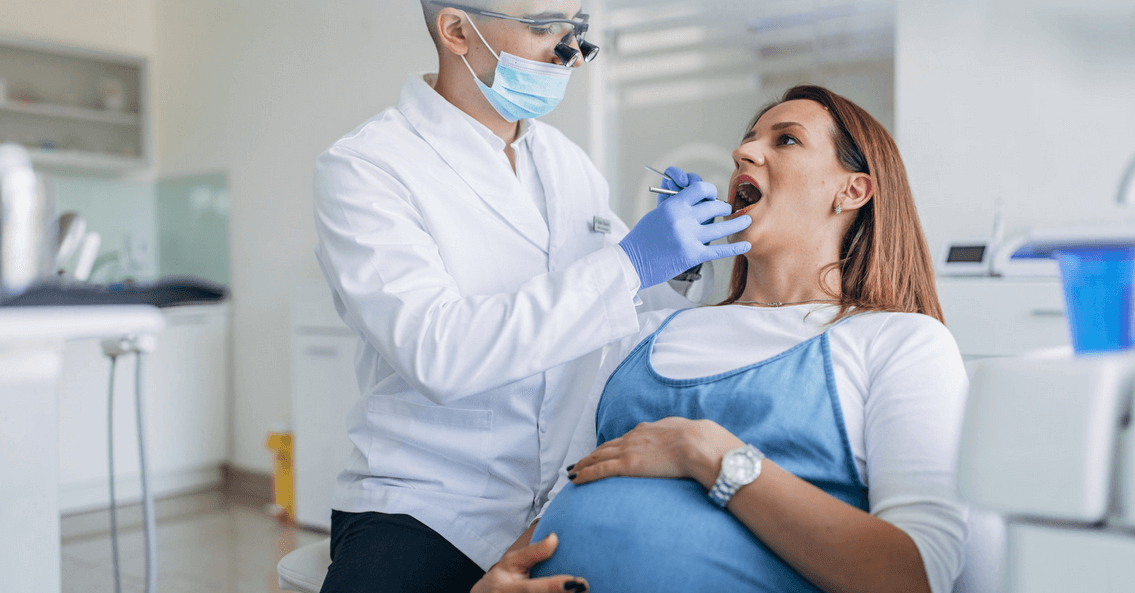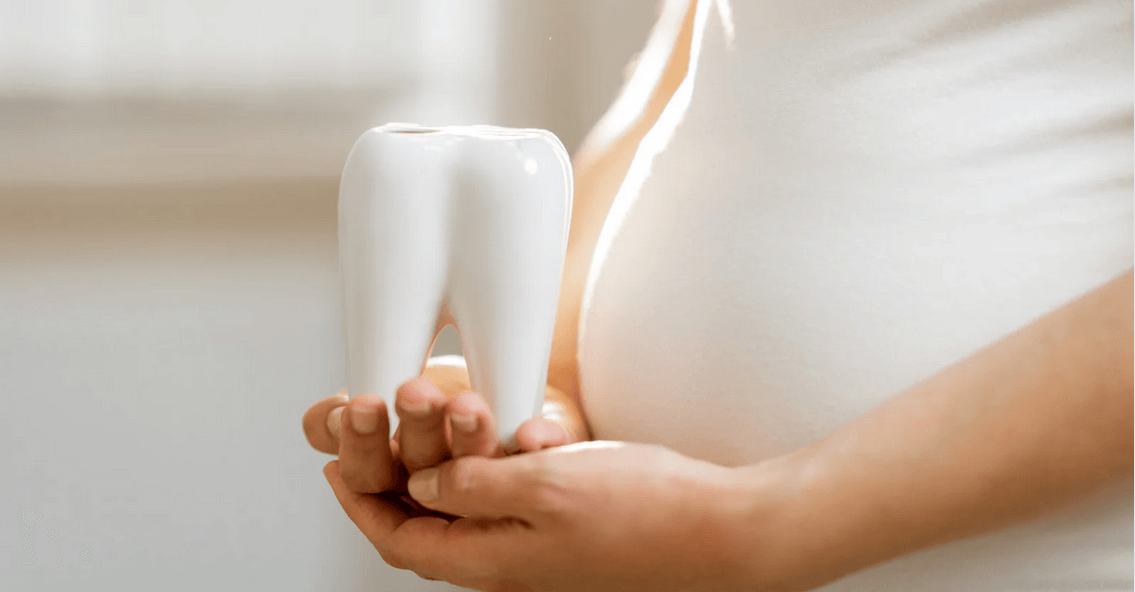The Importance of Oral Hygiene During Pregnancy
Sept 3, 2024 by Mills Haven Dental

The Importance of Oral Hygiene During Pregnancy
Did you know that nearly 40% of pregnant women experience some form of gum disease during their pregnancy? This startling statistic underscores the critical connection between oral health and pregnancy. Maintaining proper oral hygiene is not just a cosmetic concern; it plays a pivotal role in the overall health of both the mother and her developing baby. Poor oral health can lead to complications such as preterm birth and low birth weight, making it essential for expectant mothers to prioritize their dental care. In this blog, we will explore common oral health issues that can arise during pregnancy, discuss their potential impacts, and provide practical tips for maintaining excellent oral hygiene to safeguard both mother and child.
How Pregnancy Affects Oral Health
During pregnancy, the body undergoes significant hormonal changes, primarily increased estrogen and progesterone levels. These hormonal fluctuations can increase blood flow to the gums, making them more sensitive and prone to inflammation. As a result, expectant mothers may experience heightened gum sensitivity and swelling, leading to conditions such as pregnancy gingivitis. Monitoring oral health during this time is crucial, as neglected gum health can rapidly progress to more serious forms of gum disease.
Common Pregnancy-Related Oral Health Issues
Pregnancy Gingivitis
Pregnancy gingivitis is a common condition characterized by inflammation of the gums. Symptoms may include redness, swelling, and bleeding, especially while brushing or flossing. If not addressed, pregnancy gingivitis can escalate into more severe gum disease, potentially leading to tooth loss and affecting overall health. Maintaining a rigorous oral hygiene routine and visiting the dentist regularly for check-ups are essential to combat this.
Pregnancy Tumors (Pyogenic Granuloma)
These benign growths, also known as pyogenic granulomas, can occur on the gums due to hormonal changes and increased blood flow associated with pregnancy. They typically manifest as small, red, and swollen lumps that may bleed easily. While these growths are non-cancerous and often resolve on their own after childbirth, treatment options such as surgical removal may be considered if they cause discomfort or interfere with oral hygiene.
Increased Risk of Tooth Decay
Pregnant women are at a higher risk of developing cavities due to factors such as morning sickness, which can lead to increased sugar exposure in the mouth, and dietary changes that may include more frequent snacking. It is advisable to maintain a balanced diet, limit sugary snacks, and ensure thorough tooth brushing and flossing to minimize this risk.
Enamel Erosion
Frequent vomiting associated with morning sickness can negatively impact dental health by causing enamel erosion. Stomach acid can wear down tooth enamel, making teeth more vulnerable to decay. To protect enamel, it is recommended to rinse the mouth with water after vomiting and to wait at least 30 minutes before brushing, allowing saliva to neutralize the acid.
The Impact of Poor Oral Hygiene on Pregnancy
Risks to the Mother: Gum Disease and Systemic Health
The implications of gum disease extend beyond oral health, as studies suggest a significant connection between periodontal disease and various systemic health conditions. Conditions such as preeclampsia, characterized by high blood pressure and potential organ damage during pregnancy, have been linked to poor oral hygiene. Similarly, there is evidence that gestational diabetes, which affects glucose metabolism and presents risks for both the mother and baby, may also be influenced by gum health. The inflammation caused by gum disease may contribute to the systemic inflammatory responses implicated in these conditions, highlighting the importance of maintaining oral hygiene throughout pregnancy.
Infections
Untreated oral infections can pose serious risks during pregnancy, as they have the potential to spread to other areas of the body. Bacteria from infected gums can enter the bloodstream, leading to systemic infections that affect overall health. Additionally, these infections may contribute to complications such as preterm labour. Regular dental check-ups and prompt treatment of oral health issues are vital to prevent the escalation of infections that could jeopardize maternal and fetal health.
Risks to the Baby: Preterm Birth and Low Birth Weight
Numerous studies have established a troubling correlation between poor oral health and adverse pregnancy outcomes, particularly preterm birth and low birth weight. Research indicates that women with periodontal disease are at a higher risk of delivering babies prematurely or with lower birth weights. The inflammatory mediators released during gum disease may be critical in triggering labour, stressing the necessity of proactive oral care to mitigate these risks.
Potential Transmission of Bacteria
Furthermore, there is growing concern regarding the transmission of bacteria associated with untreated gum disease from mother to baby. Some studies suggest that bacteria capable of causing early childhood cavities can be passed during pregnancy, particularly at birth, or through close contact post-delivery. This underscores the importance of maintaining optimal oral hygiene not only for the mother's health but also to safeguard the child's long-term oral health.
Maintaining Good Oral Hygiene During Pregnancy

Daily Oral Care Routine
Brushing: Expectant mothers must brush their teeth at least twice daily with fluoride toothpaste. This helps to remove plaque and food particles, reducing the risk of cavities and gum disease. Emphasizing proper brushing techniques and using a soft-bristled toothbrush can enhance this routine, ensuring comfort and effectiveness.
Flossing: Flossing daily is crucial for maintaining oral health during pregnancy. This practice removes plaque buildup between the teeth and below the gumline, areas that toothbrushes may not be able to reach effectively. Regular flossing can significantly decrease the likelihood of developing gingivitis and other periodontal issues.
Mouthwash: Incorporating an alcohol-free, antimicrobial mouthwash into the daily oral hygiene routine can provide additional protection. This type of mouthwash helps control plaque and gingivitis while being gentle on the gums, further promoting healthy oral conditions throughout pregnancy.
Dietary Considerations
Balanced Diet: A well-balanced diet supports dental health during pregnancy. It is important to encourage the intake of foods rich in calcium, vitamin D, and phosphorus, as these nutrients contribute to strong teeth and bones. Dairy products, leafy greens, nuts, and fish are excellent choices for optimal oral health.
Limiting Sugary Foods and Drinks: Reducing the consumption of sugary snacks and beverages is essential to prevent tooth decay. Opting for healthier snack alternatives such as fruits, vegetables, and whole grains can help maintain stable blood sugar levels while protecting dental health.
Dealing with Morning Sickness: Expectant mothers experiencing morning sickness should adopt strategies to protect their teeth from acid erosion. Rinsing the mouth with water after vomiting helps to neutralize stomach acid, and it is advisable to wait at least 30 minutes before brushing to allow saliva to rejuvenate and reposition the enamel. These simple steps can mitigate potential damage to dental health during this challenging time.
Dental Visits During Pregnancy
Importance of Regular Dental Check-Ups
Regular dental visits are crucial during pregnancy as they allow for the early detection and management of potential oral health issues. Hormonal changes can increase the risk of gum disease and other dental problems, making proactive care essential. By scheduling routine check-ups, pregnant women can receive timely treatments, education on maintaining oral hygiene, and guidance on dietary choices that support dental health.
Timing of Dental Visits
First Trimester: It is important to schedule a dental check-up early in pregnancy to address any existing oral health concerns before they become more severe. This proactive approach allows for the identification of issues such as cavities and gum disease, which can affect both the mother and baby if left untreated.
Second Trimester: The second trimester is considered the safest time for most dental treatments. By this point, the risk of miscarriage has decreased, and discomfort is often lower than in the first or third trimester. This is an ideal time for any necessary procedures, ensuring both the safety of the mother and the health of the developing fetus.
Third Trimester: Dental visits can still occur during the third trimester, but comfort becomes a priority. Expectant mothers may need to communicate any discomfort or adjustments required for seating during procedures. Dentists will typically take precautions to ensure the mother’s comfort, such as using pillows for support and allowing frequent breaks.
Safe Dental Treatments During Pregnancy
Most dental treatments are safe during pregnancy, including preventive care like cleanings, fillings, and certain extractions. Dentists will take special precautions to minimize potential risks, such as judiciously using local anesthesia and avoiding certain medications. X-rays can be performed safely with appropriate shielding, and treatments will be personalized based on each patient's unique needs and stage of pregnancy, all aimed at ensuring maternal and fetal safety.
FAQ: Oral Health During Pregnancy
What changes can I expect in my oral health during pregnancy?
During pregnancy, hormonal fluctuations can lead to increased blood flow and changes in gum tissue, which may result in heightened gum sensitivity, swelling, and an increased risk of gingivitis. Some women may also experience pregnancy tumours, which are non-cancerous growths on the gums that usually resolve postpartum.
Is it safe to have dental work done while pregnant?
Yes, most dental procedures are safe during pregnancy, especially routine treatments like cleanings and fillings. However, it is always important to inform your dentist of your pregnancy, as they may take special precautions and tailor treatments to ensure safety for both mother and child.
How can I manage pregnancy-related gum sensitivity?
Maintaining a diligent oral care routine, including gentle brushing with a soft-bristled toothbrush and daily flossing, can help manage gum sensitivity. Additionally, using an alcohol-free mouthwash can aid in maintaining healthy gums without causing further irritation.
When should I schedule my dental check-ups during pregnancy?
It is recommended to schedule your first dental check-up as soon as you confirm your pregnancy, ideally in the first trimester. Regular checks throughout pregnancy, particularly in the second trimester, can help prevent and manage any oral health issues.
Are there any specific foods I should avoid for oral health during pregnancy?
Limiting sugary foods and beverages is crucial to preventing tooth decay. It's also advisable to avoid highly acidic foods that can erode enamel. Instead, focus on a balanced diet rich in dairy, fruits, vegetables, and whole grains to support both oral and overall health.
Conclusion
Maintaining oral health during pregnancy is essential for the well-being of the expectant mother and the developing baby. Pregnant women can significantly reduce the risk of dental issues by adopting a well-balanced diet, limiting sugary and acidic foods, and following a diligent oral hygiene routine. Regular dental visits are pivotal in early detection and management of potential problems, ensuring maternal and fetal health remains a priority. With the right care and precautions, expectant mothers can navigate their pregnancy with confidence, knowing that they are taking important steps toward safeguarding their oral health and that of their child. So, it is important for pregnant women to prioritize their dental health and seek professional care whenever needed.
At Mills Haven Dental, we are committed to helping maintain your dental well-being with personalized care. We invite you to schedule a dental check-up to ensure you take the best possible steps for your health. Don’t wait—secure your appointment today by visiting ourcontact form.